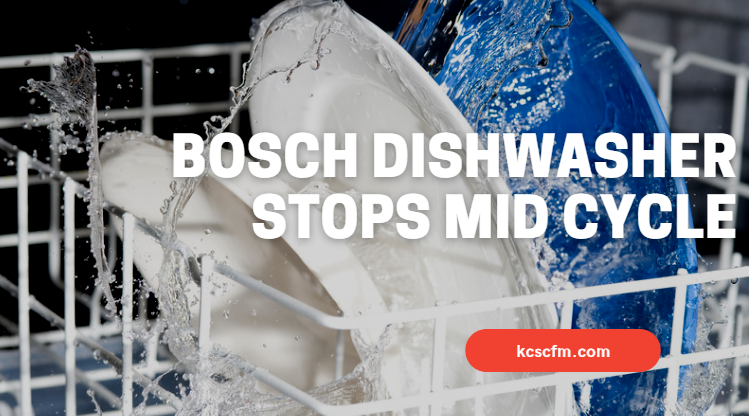The Bosch dishwasher is a fantastic machine when it’s working, incredibly efficient at cleaning the dishes and helping to reduce the amount of water used. Unfortunately, however, it is also prone to breaking down at the most inopportune moments, leaving you with a pile of dirty dishes.
So, you’re enjoying a relaxing meal when suddenly the Bosch dishwasher stops mid cycle. What can you do to fix this problem? Once the dishwasher has stopped mid cycle, there are a few different things that you can try to fix the problem.
If your Bosch dishwasher suddenly stops mid-cycle, there could be a few reasons why. First, check to see if the dishwasher is still getting power. If the dishwasher is plugged in and the breaker hasn’t been tripped, then the issue is likely with the dishwasher itself. There are a few different components that could be causing the dishwasher to stop mid-cycle, such as the door switch, thermostat, or float switch.
When a dishwasher won’t start or finish, it’s easy to assume that there is something wrong with your machine. The truth is, while the majority of issues can be solved by a repair technician, most of them result from common errors and simple mistakes.
Bosch Dishwasher Stops Mid Cycle – Troubleshoot And Diagnosis

The dishwasher in your kitchen is an essential tool; it helps automate your housework and make life more convenient. And when it stops working — for whatever reason — the problem needs to be resolved immediately.
Fortunately, there are a few ways you can identify the root cause of such an issue and solve it with minimal fuss.
1. Door Not Closed Properly
If your Bosch dishwasher stops mid cycle, it may be because the door was not closed properly. This can be a frustrating issue, as you may have to restart the cycle from the beginning.
There are a few things that you can do to troubleshoot this issue. First, check to make sure that the dishwasher is level. If it is not level, the door may not close properly. You can adjust the leveling feet on the bottom of the dishwasher to make it level.
If the dishwasher is level and the door still does not close properly, there may be something blocking the door from closing. Check to see if there are any dishes or other items in front of the dishwasher that could be blocking the door. If there are, remove them and try again.
If you’re still having trouble, you may need to consult your owner’s manual for further troubleshooting steps.
2. The Door Latch is Loose
The dishwasher latch is an essential part of your appliance, and when it’s damaged or broken, you need to replace it with a new one as soon as possible.
First, visually inspect the latch both on the moving dishwasher door and the stationary unit. Sometimes a damaged prong is visible, and you will know it needs to be fixed or replaced without removing the appliance altogether.
You can order this part online and replace the broken latch without having to take the whole dishwasher apart.
The dishwasher door latch should be inspected — even when the dishwasher is fully assembled. Damage to the door latch can cause issues with opening and closing the machine, as well as draining and filling cycles, so it’s important to check for any damage on these parts.
When a faulty dishwasher door latch or switch causes your Bosch dishwasher to stop mid-cycle, you can usually troubleshoot the problem quickly. But even though you may not have opened the door, the unit will pause the cycle when it thinks that the door is open.
2. Blown Thermal Fuse
When the fuse is in a dishwasher, it can cause the appliance to stop abruptly. These fuses are used inside all appliances to protect against overheating, electrical problems and overcurrents.
A blown thermal fuse is the most common reason why a Bosch dishwasher stops mid-cycle. The thermal fuse is a safety device that cuts off power to the dishwasher if it overheats. If the dishwasher gets too hot, the fuse will blow and the dishwasher will stop working.
If your Bosch dishwasher has stopped mid cycle and you think it may be due to a blown thermal fuse, there are a few things you can do to troubleshoot the issue. First, check the dishwasher for any signs of overheating. If the dishwasher is too hot to touch, it is likely that the thermal fuse has blown. You can also check for burned wires or other signs of heat damage.
If you suspect that the thermal fuse has blown, you will need to replace it. This is a relatively simple repair that can be done with a few tools. You can find replacement fuses at most hardware stores. Once you have replaced the fuse, your Bosch dishwasher should work properly again.
3. Tripped Breaker
If your Bosch dishwasher stops mid cycle and you find that the breaker has been tripped, it is likely due to a power surge. This can happen for a number of reasons, such as a power outage or an electrical storm.
If this happens, simply reset the breaker and restart the dishwasher.
4. Low Water Pressure
Sometimes, the dishwasher won’t get as much water pressure and as such, it’s not capable of putting out enough to operate. When this happens, the machine will stop midway because it doesn’t have enough water to run in a cycle.
When water stops flowing into your dishwasher, and the motor makes an abnormally loud noise, it could be due to a problem with low water pressure or a major water outage. To test whether the issue is low pressure or low pressure, turn on your faucet while you run the dishwasher. You can also ask neighbors to check their water supply as well.
5. Control Panel Issue
Your appliance’s control board is like its central nervous system. Like a brain, the control panel interprets information and directs your dishwasher’s many moving parts. The control panel’s design lasts a lifetime of the appliance, but anything can go wrong — from a self or wrong reset to a loose connection.
When the dishwasher control isn’t working, a simple test can solve it.
First, you need to check whether or not there’s a light indicator on the panel. Sometimes they’re missing — check the display unit carefully! Next, find out whether the dishwasher is broken or has already been reset. Resetting it could very well fix the problem and get things up and running again.
6. Check the Electronic Control Board Connection
The electronic circuit board is actually meant to last the full lifespan of the dishwasher. However, it can be damaged from water or simply burn out — especially in older models that don’t have much built-in protection. When this happens, your dishwasher will randomly run for a minute or two and then stop unexpectedly.
When a circuit board is damaged, it can cause your dishwasher to not run properly and put undue stress on the components including the heating element, door latch, and water pump. This can quickly lead to total unit malfunction and replacement.
When checking the connections on an electronic control board, as described above, with a multimeter, it is important to check the prongs and wires connected to the same buttons and components that aren’t working. Any issue with one connection may not cause noticeable problems with a dishwasher’s functionality until the point of failure.
7. Fan Assembly
In some cases, the dishwasher might technically complete the wash cycle. However, it’s possible that it will be finishing faster than usual. This can easily be determined by opening your dishwasher and checking for remaining water stains on your dishes.
Dry cycles are activated by a fan assembly. This small, low-watt part ‘blows’ air over the dishes to ensure all pieces are completely dry. Often, though, the appliance won’t clean or cause an error due to damaged parts like this.
The high-limit thermostat is a safety precaution that shuts down the heating element of your dishwasher when it gets too hot. It’s one piece of an intricate system that determines the temperature at which water meets detergent. However, when this part fails, it can disable the heating element prematurely during both drying and wash portions of your cycle; causing dishes to be washed with frigid temperatures or rinsed too quickly.
High limit thermostat testing is a crucial part of any appliance home repair. When the time comes to test it, you would want to make sure that your hands are dry and clean before starting. After this step, grab the multimeter and carefully turn on the dishwasher’s power to check for the high limit thermometer inside. You may also notice that your dishes are not quite clean in case its heating element has shut off during other periods of washing cycle in the dishwasher.
8. Pump and Motor
If your Bosch dishwasher stops mid cycle, it’s most likely due to a problem with the pump and motor. The pump is responsible for circulating water throughout the dishwasher, while the motor powers the pump. If either of these components fails, the dishwasher will stop working.
There are a few things you can do to troubleshoot this problem.
First, check to make sure that there is no blockage in the pump or motor. If there is, clear it and see if that fixes the problem. If not, you may need to replace the pump or motor.
Bosch dishwashers are known for their durability and efficiency, but even the best appliances can have problems from time to time. If your dishwasher stops mid cycle, don’t panic!
With a little troubleshooting, you should be able to get it up and running again in no time.
Final Thoughts
If your Bosch dishwasher stops mid cycle, there are a few different things that you can try to fix the problem. First, check to see if the dishwasher is still getting power. If the dishwasher is plugged in and the breaker hasn‘t been tripped, then the issue is likely with the dishwasher itself.
There are a few different components that could be causing the dishwasher to stop mid–cycle, such as the door switch, thermostat, or float switch. If you‘re having trouble troubleshooting the problem, you may need to consult your owner‘s manual for further instructions.

Hi there! I’m Sam Hendricks, and I’m a repair technician and expert. I created this website to help people like you save money and time by fixing your own appliances.
Over the years, I’ve seen people spend a lot of money on unnecessary repairs or replacements. That’s why I decided to share my expertise and create easy-to-follow guides for fixing appliances on your own.
